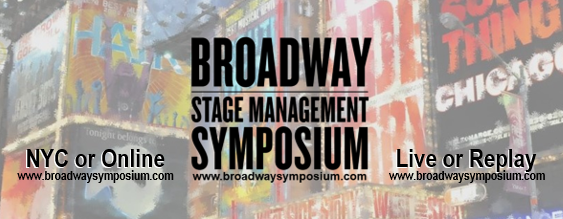
In the weeks following the Tony Awards on June 9th, Broadway has seen the closing of many shows in what I call the Reaping Season: King Lear, Network (June 9), Gary: A Sequel to Titus Andronicus (June 16), Hilary & Clinton (June 23), All My Sons, Kiss Me Kate (June 30) and The Ferryman, My Fair Lady, Ink (July 7). In the coming weeks they will be joined by, Be More Chill, The Prom, What the Constitution Means to Me, Frankie & Johnny…, Cher, Pretty Woman and King Kong! Thousands of people have enjoyed these shows; however, they will soon be gone.
Some shows last for many years, some for only a few weeks… and some just a few days. I’ve worked on shows that have lasted two years and others that have lasted a few weeks, and even one that lasted just one night! The life expectancy of a show can vary greatly, so I’m often asked why does a Broadway show close. Well, it comes down to one major factor, money.
The Broadway season goes from the dog days of summer to the springtime Tony Awards. Like the opening number from The Lion King, there is a circle of life on Broadway from hopeful opening, to exciting awards season, to painful closings. Then it all starts again.
After years of development, readings, workshops, out of town tryouts, rehearsals, tech, previews and finally the Broadway opening, it can be heartbreaking to see a show close its doors. Broadway shows need ticket sales to survive and there are many contributing factors that can add or detract from a show’s ability to sell tickets.
Most apparent are the reviews. Critics write articles about their thoughts and opinions of a show. They can say if it’s worthy of seeing or maybe that it’s a must see (music to producer’s ears!) or they can write it’s bland or boring and not worth the price of admission. These kinds of statements can obviously help or hurt ticket sales.
Word of mouth is a huge factor as personal recommendations carry a lot of weight. However, it takes time to build momentum and ticket sales this way. It’s not always possible for a show to stay while word of mouth matures into ticket sales. Marketing is an important factor as it builds awareness of the show, hopefully increasing the desire to see the show. As awareness of the show in the marketplace increases, so does the likelihood of people to purchase tickets. Press coverage can have a similar affect, but it’s even better, as producers don’t pay for press coverage. Press reps find the good stories to communicate to news outlets, schedule interviews with their stars & celebrities and try to keep the show in the news.
Finally, the awards! Awards give shows a powerful tool. People love competition and winners. So Awards become news stories and a strong marketing tool to stand out from other entertainment options. There are many different awards for theatre, but the most prominent is the Tony Awards. With national TV coverage, it has the potential to be in homes all over the country and therefore can be the key to saving a show and/or creating a blockbuster. Just appearing on the show can be a boost to ticket sales, but nothing beats winning to create buzz and generate box office. The shows that win awards, specifically, the big ones (Book, Score, Director and Best Musical/Play) are virtually assured a shot at a profitable run.
In a way, the Tony Awards, can be like a fountain of youth, giving new life to struggling shows or increasing the virility of a show to make it a dynamic hit. A show with slow ticket sales before the Tony’s rarely lasts long after the telecast is over. Their circle of life is most likely coming to an end, unless they have the financial cushion (aka reserve fund) to make it through potential losing weeks, while marketing and word out mouth builds. Even with a cushion, there is always another show waiting in the wings for their theatre.
That is another key element of why shows close, the lack of available theatres. There are only 41 Broadway Theatres. Many of these are filled with big hits that have been running for years: Phantom Of The Opera, The Lion King, Wicked, Dear Evan Hansen, Chicago, Harry Potter…., Hamilton, Book of Mormon, Aladdin, Come From Away, Frozen, Waitress & Beautiful and more recently: Mean Girls, Hadestown, Oklahoma!, Tootsie, & Ain’t Too Proud, that’s 18 theatres locked up.

Take out the LORT on Broadway theatres, as the American Airlines, Samuel Friedman & Helen Hayes are not usually available to independent producers, and you have cut the number in half… only 20 Broadway theatres available for the hopes and dreams of writers, producers and creatives and their next great show.
This means competition is fierce and struggling shows have to watch their back. Why? Because the theatre owners have an option called the Stop Clause. This part of their contract with show producers allows theatre owners to close a show if it is struggling to clear a certain amount in grosses after a specified number of weeks. So even if a show has a comfortable cushion to weather the stormy seas while marketing, press, social media and word of mouth work to bring in more profits; a struggling show can still be forced to close.
In the survival of the fittest on Broadway, the shows that come out hot and/or win the big awards, have the best chance for survival. And if you don’t do either of these, most likely you will be part of what I call, “the reaping season” on Broadway. These are what we are in now… the dog days of summer when many shows take their final bows. From this June to August, sixteen shows will close!
Shows open, knowing they will close. It’s only 1 out of 5 shows that actually recoup (make back their initial investment); the other 80% don’t make a penny, close and make way for the next batch of shows. On Broadway, that means we get to look forward to Moulin Rouge (in previews already, thanks to Kinky Boots closing), Jagged Little Pill and more.
As the Circle of Life continues, these new shows are born, live a fabulous life, share their amazing stories, songs and dances and then eventually pass. Even Cats with their “Now and Forever” marketing campaign closed, as one day will Phantom and Hamilton too. The live experience and the closing of a show is one of the characteristics that make theatre so special. It only exists in the here and now. You can’t bottle it, save it forever or take it with you. It’s similar to the theory that our lives have value because we don’t live forever. We have to appreciate each moment we have, be it with your loved one, performing in a show or seeing a show. The moment you are in is now and then it is gone.
As Mufasa says, “One day, Simba, the sun will set on my time here, and will rise with you as the new king…. When we die, our bodies become the grass, and the antelope eat the grass. And so we are all connected in the great Circle of Life.”
Advice for Stage Managers from Dr. Seuss
The Misconceptions & Myths of Stage Management



The mission of the Broadway Stage Management Symposium is to create a safe and welcome place for stage managers to connect, share, learn and inspire. Each year, our annual event brings together the most experienced and highly-regarded Stage Management professionals on Broadway for a two-day program that offers practical insights, instruction, and inspiration for anyone interested in stage management. Through a variety of panels, Broadway’s stage managers share their experience, techniques, offer practical career advice, and answer questions. These sessions dive deep into important issues for stage managers of all levels, revealing insights into the why’s and how’s of stage management, that only come with the benefits of decades on Broadway. This unique forum presents opportunities to engage with top professionals as well as network with fellow attendees, exponentially growing professional relationships and opportunities. Past attendees have come from all over the U.S., as well as Argentina, Bolivia, Canada, Mexico, and Australia and some alumni have gone on to work on Broadway shows. By sharing their knowledge, Broadway stage managers give a hand up to the next generation, illuminate proven strategies for success, and advance the profession. As the leaders of a company, stage managers’ actions have a significant impact on a show and its participants. The Symposium helps stage managers develop the tools for successful leadership and stewardship. In this way, the Symposium can have a positive impact not only on stage managers’ career, but the industry at large. Please join us for our annual event and the ongoing conversation all year long over our social media platforms (twitter, Instagram, facebook & tumblr) as well as the Symposium blog.
Read Full Profile© 2021 TheatreArtLife. All rights reserved.

Thank you so much for reading, but you have now reached your free article limit for this month.
Our contributors are currently writing more articles for you to enjoy.
To keep reading, all you have to do is become a subscriber and then you can read unlimited articles anytime.
Your investment will help us continue to ignite connections across the globe in live entertainment and build this community for industry professionals.